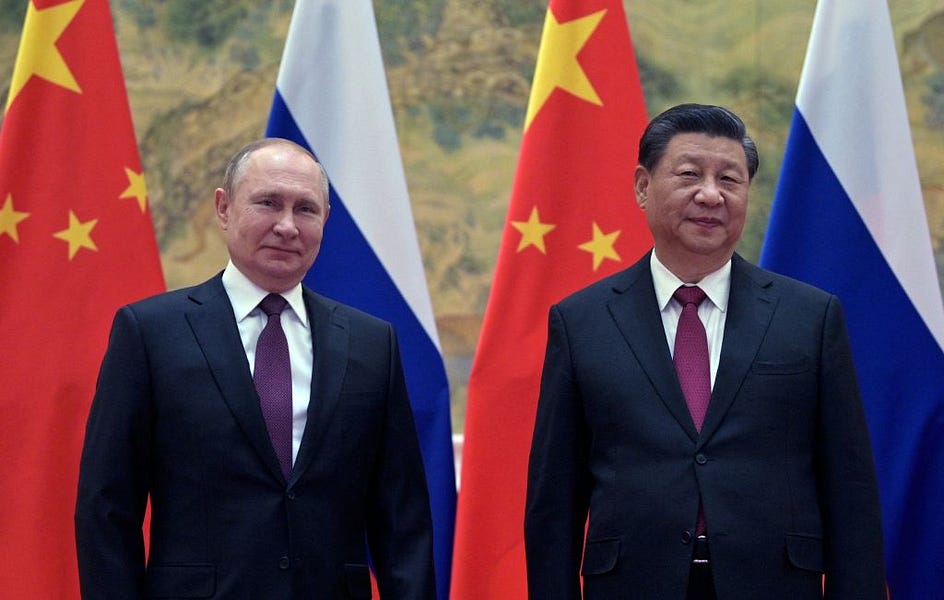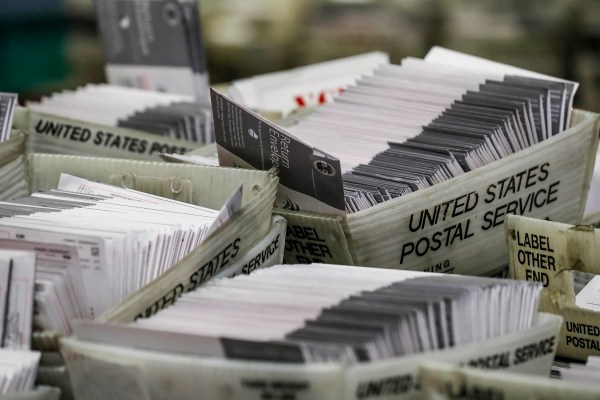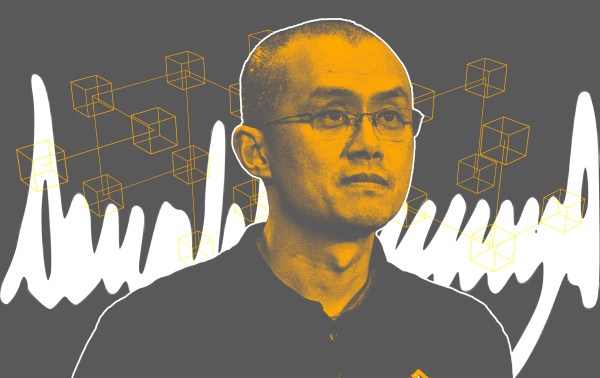There are some obvious parallels between Ukraine’s situation and Taiwan’s. Both are smaller (though not small) democratic countries right next to enormous, aggressive, nuclear-armed dictatorships—dictatorships whose rulers are fixated on crushing the smaller neighbor in question. To be sure there are a lot of huge differences. For example, Taiwan has never officially claimed to be independent of China, unlike Ukraine which has been independent—and recognized as such by Russia—since 1991. Also, unfortunately for Ukraine, there is not a moat of ocean between Putin and the Ukrainian people like there is between Xi and the Taiwanese. Even so, many commentators have recognized these analogous situations in Europe and Asia and have written about the lessons Taiwan or Communist China might draw from Putin’s war against Ukraine. Despite their oft-repeated statements that they are allies, it isn’t possible to make out any common position or unified China-Russian strategy in Europe or Asia. However, looking at recent Russian and Chinese statements about Ukraine one can see one consolidated theme: Anti-Americanism.
In a recent statement Grigori Zinoviev, the director of the First Asian Department of the Russian Foreign Ministry, tried to point out this similarity between the Ukrainian and Taiwanese case:
“What happened in Ukraine has a very similar methodology to how the United States is working regarding Taiwan, because they [the Americans] are pumping it full of their weapons. The same thing happened in Ukraine, … The Westerners are working on using Taiwan against China and using Ukraine against Russia—there is a very clear similarity here. [Although] from the point of view of international law, there are already some nuances there,”
This may be part of a Russian attempt to curry favor with China, presenting themselves as China’s natural ally in the face of American aggression—aggression that takes the form of supporting democracies that Russia and China both despise.
The actual stance of the PRC about the war in Ukraine is not simple to suss out. On the one hand Chinese officials have thus far balked at giving direct support to Russia (as far as we know). The U.S. has recently warned China of repercussions if it aids Russia’s war effort directly. On the other hand, the PRC hasn’t condemned Russia’s invasion of a sovereign neighbor that is recognized by China, nor has it joined in any sanctions. Early on, one might have suspected that China would take Russia’s side more vociferously. On February 4, 20 days before the war started, Russia and China issued a joint statement on “the International Relations Entering a New Era and the Global Sustainable Development ” that declared that their partnership had “no limits.” (This statement included a section presaging cooperation between Russia and China in disinformation campaigns accusing the U.S. of having a secret biological weapons program.) However, despite this “permission slip” for Russia, since February 4, China has not given full-throated political support for Putin’s Ukrainian policies, at least not in statements intended for an international audience. Putin’s expanded invasion has turned Russia into an international pariah almost overnight, and Communist China might not want to associate itself with a pariah, even while it engages in actions (like the Uyghur genocide) which should give it pariah status itself.
Perhaps part of the answer as to why China is not supporting its authoritarian ally more actively is because Putin screwed up. In the universe that Putin (and probably Xi) wish they were living in, the Ukrainian state has collapsed, Zelensky is on trial, and China and other countries have already recognized the successor puppet government in Kyiv. Instead, Putin’s failure to take Kyiv and destroy Ukraine quickly has resulted in a long war, potentially a very long war. This war might have serious repercussions for the global economy and therefore on Chinese politics.
The most obvious potential economic consequences of Putin’s war are in the energy sphere. If Russia’s invasion of Ukraine causes Europe to make the economically painful but politically wise decision to halt imports of Russian oil and gas (or, as we’re seeing now, leads to Russia refusing to deliver energy to “unfriendly” countries), it is almost certainly going to raise oil and gas prices in China as well. The lion’s share of Russia’s oil and gas pipeline infrastructure goes into Europe. To take a look just at gas: In 2021 Europe imported 155 billion cubic meters of gas from Russia, with 52 billion cubic meters of that heading through Ukrainian pipelines or other nearby routes. There is only one Russian gas pipeline going into China, and it has a capacity of 38 billion cubic meters a year. The sudden shut off of gas exports to Europe would mean a lot less gas on the global market, and China would have to compete with Europe for the import sources that are left.
China’s strategic interests and goals in Putin’s Ukraine war are not clear, but when it comes to their propaganda, the opinion of the PRC propagandists is as clear as a bell. Both regimes have ditched Marxism, Russia explicitly and China practically, but both have retained the idea that the free world is actually a menacing “imperialist” empire run by the U.S. The fact that the U.S. supports both Ukraine and Taiwan helps the Russian and Chinese regimes present both conflicts as part of a single phenomenon: U.S. imperialism. Take this example from a Chinese military paper, published in mid-March:
It was the U.S. that laid the fuse that has led to the war today. For many years, the superpower has played two dirty tricks to suppress and contain Russia and squeeze its strategic space— pushing NATO’s eastward expansion and instigating “Color Revolution” around Russia.”
The propagandist makes sure to emphasize that this is not the U.S. “accidentally” creating the conditions that generated this Russian response (a theme one hears regularly in neo-isolationist circles in the U.S.), it is part of a deliberate American plan to harm Russia:
In the new century, the US has kept stirring up the ‘Color Revolution’ around Russia, fostered pro-US regimes and forces, and made Ukraine a ‘bridgehead’ to achieve its own geopolitical goals by using it as a chess piece to isolate and suppress Moscow… Inciting the Ukraine crisis is a carefully planned and crafted move by the US, through which it can not only besiege Russia but also take over European affairs and make a fortune selling weapons into the bargain.
A Chinese reader would not be able to avoid noticing parallels to Communist China’s stance on Taiwan and American policy in Asia: The US is not trying to defend democracies and preserve regional stability—it is trying to “contain China” (contain it from doing what?) and plotting to use Taiwan and other allies to harm China. A less sophisticated version of this story showed up on the WeChat account of the state-backed China Daily last week in this animation, which I urge you to watch:
This is a song that goes (to the tune of “If You’re Happy and You Know It):
Look! There is an eagle flying to Ukraine! (*clap*clap*)
Look! Now it is approaching to Taiwan! (*clap*clap*)
The eagle now is snickering
Playing as a guardian
Spoiling peace worldwide
It is the US! (*clap*clap*clap*clap*)
If you want peace, then you say it now! (*clap*clap*)
If you want peace, then you say it now! (*clap*clap*)
For the planet to have tomorrow
Please eliminate the sorrow.
Tell Uncle Sam to go home.
Tell him now! (*clap*clap*clap*clap*)
(Side note: Watching some Chinese propaganda almost makes me admire the Russians who quite often put some real effort into their productions. This Chinese video looks like it was made by a middle schooler trying to mock anti-American propaganda.)
The idea that Ukraine and Taiwan are just extensions of an American empire, and part of our aggressive designs against China and Russia, has even shown up in some discourse in the West. This isn’t new, but what is interesting recently is how much more cache this idea has on the right in the U.S. outside of its traditional home in the U.S. far left. Calls to arm the Ukrainians are sometimes depicted as forms of aggression, rather than part of efforts to halt Russian aggression, and a regular refrain one hears is that the U.S. should “support peace” by insisting that Ukraine cease defending itself and negotiate or surrender to Putin. Fortunately this analogous idea with the Taiwan scenario seems to be less popular in the U.S., but we should not be so certain that will last. With all the resources at its disposal and even with help from Russian propagandists, China may step up its propaganda game in the coming decade and, perhaps with help from Russian propagandists and/or American PR experts getting paid top dollar (which is even more likely), deliver this kind of message to Western audiences even more effectively than Russia can.
As happened in the Cold War, the message of the dictators will probably focus on the “peace” angle—like that Chinese propaganda animation. Any defense assistance the U.S. gives any ally will be presented as threatening peace, an escalation, possibly even the start of World War III! As during the Cold War the friends of freedom will have to make serious efforts to communicate to the U.S. and Western public the dangers of inaction and letting anti-US dictators get whatever they want. The shape of that effort might be the subject of a future article, but for now let’s just remember this single quote from the 18th century Prussian military thinker Carl von Clausewitz: “The aggressor is always peace-loving … he would prefer to take over our country unopposed.”







Please note that we at The Dispatch hold ourselves, our work, and our commenters to a higher standard than other places on the internet. We welcome comments that foster genuine debate or discussion—including comments critical of us or our work—but responses that include ad hominem attacks on fellow Dispatch members or are intended to stoke fear and anger may be moderated.
With your membership, you only have the ability to comment on The Morning Dispatch articles. Consider upgrading to join the conversation everywhere.